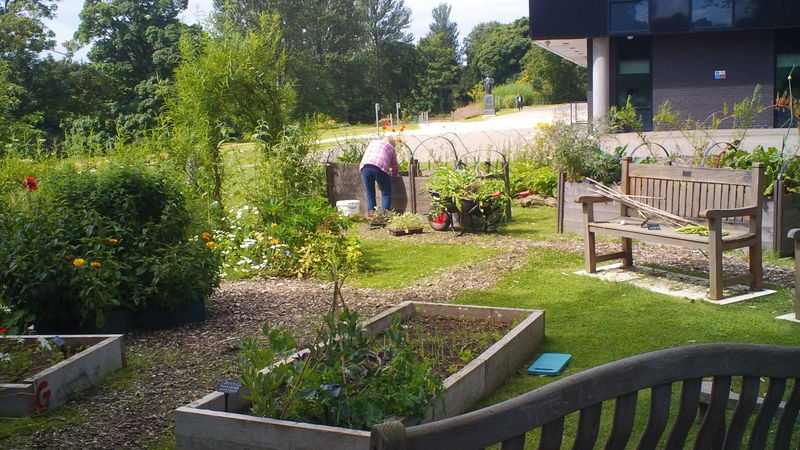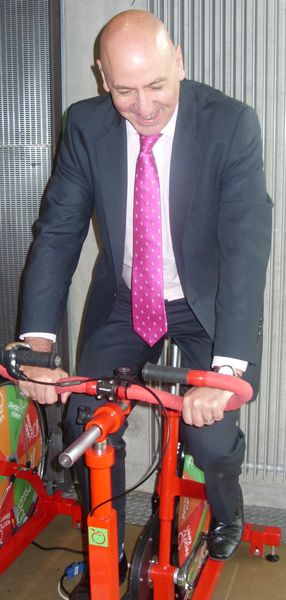University of the West of Scotland
With a bold corporate strategy target to reduce our CO2 emissions by 20% by 2020, University of the West of Scotland (UWS) is committed to reducing their carbon footprint through embedding a sustainable carbon culture. Their inspirational Estates master plan will transform learning environments, providing contemporary, student centred spaces.
UWS understand that de-carbonising their estate, though crucial to UWS goals, is a drop in the ocean compared to the impact we can achieve as an education provider. UWS fosters a culture of global citizenship, equipping their students with relevant sustainability education, embedded into academic learning, which will make them exceptional candidates in today’s employment market.
Their courses are only part of the experience of university life and sustainability provides an ideal vehicle to enrich the student experience. The UWS community gardens and sustainability hub create opportunities for students to get together and foster relationships with their peers, UWS colleagues and the wider community. The benefits of these initiatives are multifaceted improving health and wellbeing, reducing carbon and providing a valuable service to students in the provision of essential goods though the hub free shop.
Student Success
UWS provides a rounded experience for our students with opportunities for volunteering, participating in sustainability focused activity and Education for Sustainable Development that will reap benefits in employability, health, social and environmental wellbeing.
Case Study
Delivering Sustainable Events Education – Shortlisted for a Green Gown Award 2014.
Academic colleagues required a simple method of embedding sustainability into their subject area that could easily slot into teaching, be tailored and relevant to the course in question.
Our goals
• To provide a straightforward, tailored toolkit to increase Education for Sustainable Development at UWS.
• To increase sign up to the Green Impact Programme.
• To reduce carbon emissions at UWS.
The approach
The Events Management academic staff were engaged with the NUS Green Impact Programme and recognised its potential to be adapted as a teaching resource. The Course Leader worked with the UWS Green Impact Co-ordinator and NUS to adapt the workbook in order for it to be used by events students to audit and improve the environmental sustainability of events venues across UWS. Forty eight students participated, covering nine event locations. The groups compiled environmental impact reports for an event, and worked closely with UWS staff in each venue to encourage ‘greener’ actions through the use of the Green Impact tool kit. The project ran for a trimester with 129 Green Actions achieved.
Roll Out
Green Impact Education will focus on the School of Health, Nursing and Midwifery in 2015/16, embedded into 14 courses.
Research, Enterprise and Education
UWS Centre for Environmental Research is actively involved in research, enterprise and engagement in the area of sustainability. Research is strongly linked with enterprise, forging strong partnerships with industry to increase efficiency, reduce environmental impacts and ensure UWS is at the lead in environmental research. UWS Academic staff and post graduate students undertake research in areas as diverse as sustainable mining practices (including more sustainable ‘greener’ hydraulic fracturing (or fracking) practices), climate change, aquaculture and waste water treatment.
Case Study
One such example of a sustainability project that involves researchers from UWS and industry is a Knowledge Transfer Partnership project with a local water treatment company which looks at the recovery of potentially toxic metals from effluents from industrial processes and the purification of the captured waste for re-sale as a raw material. Academic expertise is being used to study the effectiveness of different treatment options on the efficiency of the recovery processes.
UWS Global Reach
UWS has a key role to play in equipping our students with the knowledge and skills required to be valued global citizens. We lead by example, contributing to our local and global community through the development of innovative partnership projects that have a positive impact on the economic, social and environmental sustainability of these communities.
• We will continue to build on partnerships with Oxfam and Alzheimer’s Scotland.
• We have community gardens at three of our campuses. As well as improving the health and wellbeing of staff, students and the university environment the gardens provide a real opportunity to foster links with the local community.
• UWS is a member of the United Nations Global Compact and is committed to delivering its 10 principles in the areas of human rights, labour, the environment and anti-corruption.
Case Study – community gardens outreach
The Community Garden Co-ordinator is working in partnership with Alzheimer's Scotland to develop a productive fruit and vegetable growing space at their day-centre in Paisley. This project enables people whose lives are affected by Alzheimer's to benefit from therapeutic horticulture, alongside the health benefits of organically produced local food.
SAUWS Environment is also working in partnership with Migrant Help Paisley to support an anti-slavery and human trafficking project through providing window-sill planters for individuals to grow food at home.
UWS People
Staff engagement is critical to a successful UWS, with people who are driven and supported to provide an exceptional educational experience for our students. UWS Sustainability delivers a range of initiatives and benefits that support staff in adopting sustainability actions; reducing carbon, saving money and improving health. Activities also support academic colleagues in embedding sustainability in course work design.
How we achieve this:
• Continue to deliver the UWS Green Impact programme to 18 active teams with targets for expansion year on year.
• Cycle to work scheme with over 100 applicants.
• UWS Journeyshare scheme with 530 members.
• Continue to grow our UWS Community gardens, promoting the health, social and environmental benefits to the UWS community.
• Roll out Green Impact Education, providing support for Academic colleagues in embedding sustainability.
Cycle to Work case study
Dr. Glenn R Marland, Senior Lecturer and Subject Lead Mental Health and Amanda Carson, Lecturer in adult nursing describe how the scheme has benefited them. Glen stated:
“Since buying a bike on the Scheme I have become inspired to cycle more and even joined the local cycling club. The increase in physical activity resulted in losing nearly 2 stones in weight and becoming much fitter generally as well as gaining a whole new social circle. I would recommend this to any member of staff.”
Amanda detailed the following advantages of the scheme:
“The benefits financially of cycling to work are reduced fuel costs and less wear and tear on my car. I really liked the scheme because I hardly noticed I had bought the bike as it comes off before tax.
The benefits to me are the extra exercise I can fit into my day. It allows me to unwind on the way home. My commute is five miles and it takes me half an hour either by car or bike. Although the car is faster in some places, the bike allows me to whiz through the traffic which is great.
Taking the bike requires more organisation as I need to plan ahead what I am doing and take clothes to change into. I can’t cycle everyday as I have to travel for meetings or collect things on the way home but I try to cycle as much as possible.
The scheme has made me cycle more in my leisure time so it has impacted more on my health than I thought it would. The scheme was recommended to me by a colleague and I recommend it to others.”
UWS Money and Infrastructure
UWS Estates Strategy provides the vision for progressive, efficient and sustainable learning environments. We embed sustainability in our estates, from the provision of sustainable travel infrastructure to the inclusion of low carbon technology in project design.
How we achieve this:
• We have reduced our energy carbon footprint by 20% since 2008 through efficient, heating, lighting, ICT and space utilisation.
• We have reduced our water carbon footprint by 56% from 2008 through installation of waterless urinals, low flush toilets, leak detection and downsizing of water meters.
• We have reduced our carbon footprint from waste by 43% since 2008 through the implementation of segregated recycling facilities.
• We will further reduce our carbon footprint by 20% by academic year 19/20.
Paisley Heating Phase One Case Study
Replacement of inefficient boilers and distribution network at Paisley campus in 2013 achieved significant reduction in carbon emissions and costs. Gas emissions at Paisley reduced by 600 tonnes of CO2e, saving £78,833 in the first year. As part of the developing Carbon Management Plan a feasibility study will be carried out to look at the potential for the use of low carbon technologies in further reducing the carbon from Paisley heating.
Shared Services Case Study
The University of the West of Scotland and Scotland’s Rural College staff and students in Ayr enjoy superior facilities made possible through successful collaboration resulting in the creation of an award winning BREEAM excellent shared campus. From project initiation the client team promoted sustainable building design which reflected the collaborative approach (better for less) that was being adopted by the Institutions. Awarded Green Gown Award for Modernisation – Effectiveness and Efficiency in the Estate 2012.
Main Contact Name: Claire Roxburgh, Energy & Environmental Manager
Main Contact Email & Telephone: [email protected] 0141 848 3993
Further information/website: www.uws.ac.uk/sustainability
Share with us: www.twitter.com/sustainUWS












